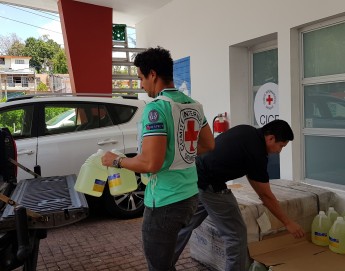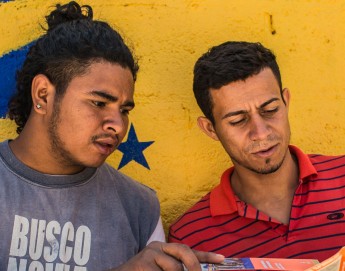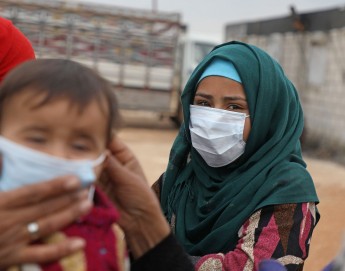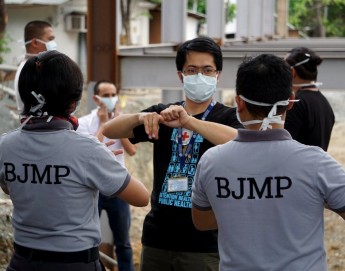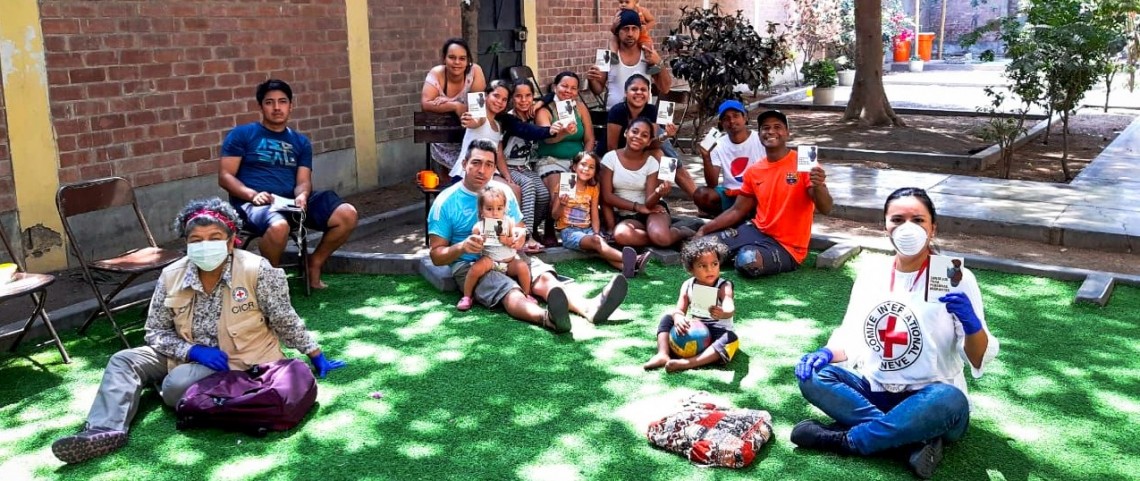
ICRC in Latin America: How we are adjusting our action during COVID-19
In Latin America, the ICRC advises and supports authorities, National Red Cross Societies and civil society and alerts them to suitable methods of improving the humanitarian situation and the response to COVID-19.
Migrants, including refugees, the family members of missing persons, the homeless, detainees, seniors, health workers and persons with chronic illnesses are particularly vulnerable during this emergency.
This tailored approach includes measures and actions designed for the persons whom we assist, our own staff and our partners in the International Red Cross and Red Crescent Movement. It encompasses joint action with National Red Cross Societies to prevent infection with and the spread of the virus among migrants, including refugees, in shelters, among persons deprived of their liberty in prisons and among displaced persons or communities affected by violence.
Our main lines of action in each country:
Shortcut to country or region:
Colombia / Venezuela / Mexico and Central America / Lima regional delegation (Bolivia-Ecuador-Peru) / Brasilia regional delegation (Argentina-Brazil-Chile-Paraguay-Uruguay) / Panama
Colombia
In Colombia, the main focus of our work is support for vulnerable population groups who live in areas affected by armed conflict and violence. We seek to improve hygiene and ensure the continuity of essential services such as access to water, sanitation, hygiene products and disinfectants.
We support health institutions, such as hospitals and health centres by providing them with medical equipment, personal protective equipment (PPE) for health workers, hygiene kits and disinfectants and hospitalization facilities.
We likewise supply food and personal hygiene articles to migrants placed in isolation in shelters and migrants who are settled in Colombia who are experiencing economic insecurity owing to the pandemic. In addition, we are rolling out technical guidance to health facilities and timely support for updating the response to the coronavirus.
As far as forensic services are concerned, we supply protective material for staff in charge of managing bodies in morgues as well as for pathological institutes and hospitals which provide services for dealing with the pandemic.
Emergency relief for victims of armed conflict and violence comprises individual assistance for 1,800 families (including 280 family members of persons who have been reported missing). Food and household staples are to be delivered to 5,000 persons in communities affected by mass displacement or confinement.
We have scaled up our food aid for migrants and vulnerable residents, which is now reaching an estimated 30,000 persons.
We have helped the prison authorities to implement more stringent preventive measures in 25 permanent detention centres (holding approximately 78,000 persons who have been deprived of their liberty) by providing protective equipment, hygiene and disinfection products and material to make personal protective articles (such as masks), and by installing hand-washing facilities in strategic areas of prisons (reception area, sick bay or isolation wing).
We are also contributing to the psychosocial counselling and activities to improve mental health provided by listening centres and other partners in order to ensure that victims of conflict and violence receive ongoing care. Similarly, we are helping to run telephone hotlines for the relatives of persons who have been reported missing and support groups for patients requiring specialized follow-up care. Psychosocial counselling will be extended to further groups affected by the pandemic, such as health workers who are stigmatized or traumatized by overwork and workers in mortuaries.
We are assisting victims of anti-personnel mines and other explosive devices by advocating that local authorities ensure these persons' access to their rights and economic support in order that their basic needs and those of their families can be met during the COVID-19 emergency.
In regions to which the Colombian Red Cross has no access because they are under the control of organized armed groups, we disseminate COVID-10 prevention programmes and messages about respect for health workers, and we offer psychosocial counselling to these communities to mitigate the stress caused by the pandemic.
Venezuela
In Venezuela, the ICRC along with the Venezuelan Red Cross and the International Federation of Red Cross and Red Crescent Societies have reorganized their humanitarian response in order to contribute to the prevention of the coronavirus and to the care of sufferers. We are therefore focusing our action on providing technical and material support for the health and sanitation facilities where they work and giving the requisite assistance to the most vulnerable communities.
In health centres throughout the country we have helped to update contingency plans for the medical treatment of persons infected with COVID-19 (triage and observation areas, admission and isolation wards, intensive care units and patient flow). We have provided a number of hospitals with biomedical equipment to treat severe or moderately ill patients: ventilators with breathing circuits and filters, BiPAP masks, anaesthesia machines, pulse oximeters, infrared thermometers, oxygen concentrators, resuscitation and intubation equipment, defibrillators, etc.
We have stepped up the continuous training of medical, nursing and maintenance staff in the use of PPE. The training was given through virtual and attendance-based courses to 800 health care providers. It covered general preventive measures, PPE, the prevention and control of infection, hygiene routines, etc. More than 800,000 items of medical supplies, including PPE, hygiene kits and educational material have been distributed to 14 health care facilities (hospitals and comprehensive diagnosis centres). Medical equipment was recovered and handed over to hospitals, such as the Ruiz y Páez, in Bolívar State, in the south of Venezuela. It comprised such items as nebulizers, nebulizer masks, flow meters and other consumables for mechanical ventilators which are vital in order to cope with the coronavirus.
Technical assistance and medical supplies were provided for temporary shelters located on the border between Venezuela and Colombia. Returnees in quarantine received primary health care. Some 13,000 persons benefited from this support.
The ICRC teams have been in constant contact with the prison authorities to enable them to heighten the effectiveness of their response to the emergency in the country's prisons. The health staff of prisons have been trained inter alia in general hygiene measures to prevent and control infection and in hygiene routines. Protocols have been drawn up for prisons. Contingency plans have been updated and a procedure for the active monitoring of symptoms among inmates has been established. Support has been given to the upgrading of sanitation through the supplying of water from tank lorries to one prison, the donation of cleaning and disinfection material to another and the provision of cleaning products and disinfectants for the kitchens of a third prison.
In the field of forensic pathology, we have mainly assisted morgues with material and basic recommendations concerning the management of the bodies of persons who have died from COVID-19. We have given specific advice on personal protection measures and made recommendations regarding family members' needs in order to avoid non-identification, unjustified cremations or mass burials.
Hospitals have been helped to improve their water supply and sanitation systems. Hand-washing facilities were installed or repaired and chlorine tablets were distributed to four outpatient clinics. Tank lorries delivered 1,280 m3 of water to the San Antonio bus terminal (in Táchira State) which is currently being used as an assembly point for returnees.
The ICRC is continuing to respond to the needs of persons who have been separated from their families (by migration, violence, or for other reasons) by making it easier to obtain information about their whereabouts and re-establish contact with them. In Guasdualito (Apure State) communication services were supplied to more than 800 returnees in the 20 shelters where they are quarantined.
In shelters and nursing homes in Táchira State a communication service was offered to persons who want to restore or maintain contact with their family on account of the emergency. This was done at the same time as the Migration Department distributed hygiene kits. Connection points have been installed in Venezuelan Red Cross offices in Yaracuy and El Tigre to enable patients in outpatient clinics and shelters to call their relatives and recharge their mobile telephone batteries.
In the field of economic security, the ICRC endeavours to assist the most vulnerable communities by offering financial support to the El Callao Parish canteen (Bolívar State) to enable it to buy food and hygiene products. Every day, this public canteen serves more than 250 vulnerable people in this community. Financial assistance was also given to two public canteens in Boca de Grita (Táchira) to buy food for 500 people in the community. In addition, the ICRC helped to buy cleaning and hygiene products for 14 public canteens in the districts of Petare Norte and Cota 905 in Caracas, and for two school canteens in San Félix (Puerto Ordaz), in order that they could adhere to good hygiene practices.
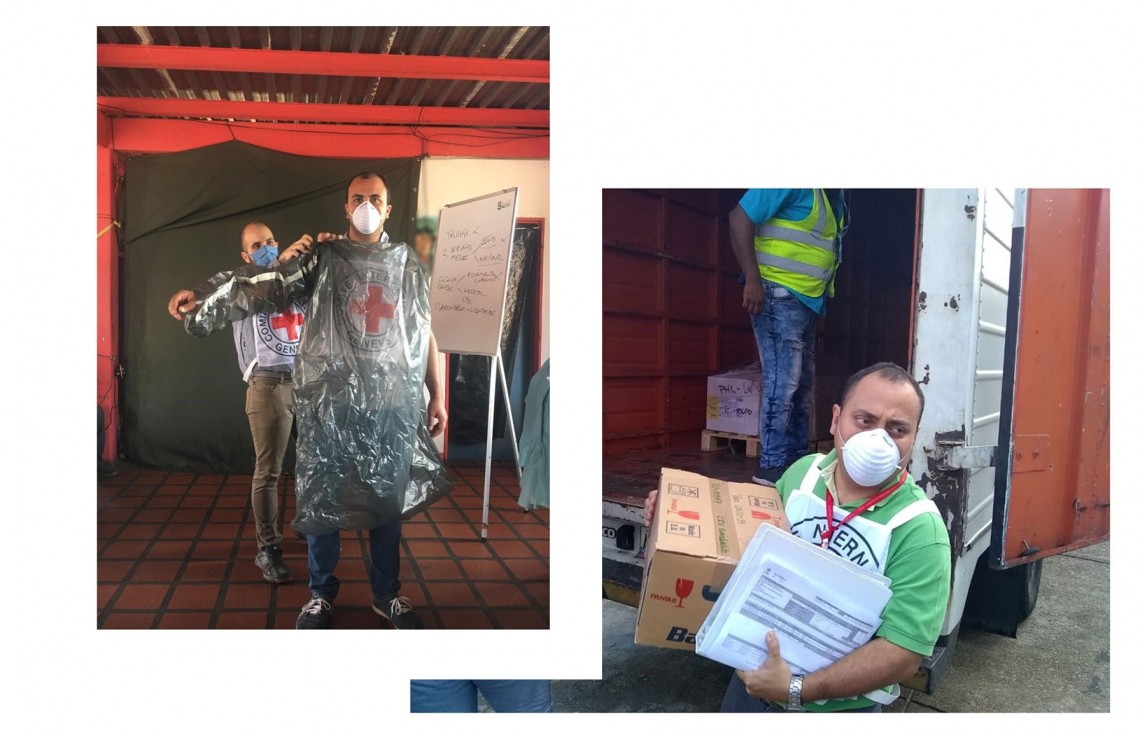
In Trinidad and Tobago, Aruba and Curaçao, the ICRC is continuing to work with the National Red Cross Societies in each country to strengthen their Restoring Family Links services and to distribute informative material on the prevention of the coronavirus.
Mexico and Central America
In Mexico and Central America, the ICRC has focused its efforts on the two most vulnerable population groups, namely persons deprived of their liberty and migrants, including refugees. It has likewise disseminated disease prevention information, including mental health advice, to the general public and to communities affected by violence.
In Honduras, Mexico and El Salvador, we shared with judicial officials other judicial systems' experiences in reducing the prison population who, by reason of its health condition, is regarded as being at most risk of COVID-19, and we passed on existing court decisions on the subject. Many of our recommendations have been followed in countries such as Honduras, where the authorities have taken major steps to reduce overcrowding.
Over the last few weeks, the ICRC has donated hygiene articles, water tanks, disinfectants and material to protect prison staff and persons being held in detention centres in El Salvador, Honduras, Guatemala and Nicaragua.
In Honduras, we supplied the National Prison Institute (INP) with protective, biosecurity and cleaning products, including medical masks, gloves and chlorine disinfectant for surfaces, among other things. In Nicaragua we donated material to protect staff, including plastic safety glasses, surgical masks, gloves, etc.
The response to humanitarian needs resulting from the emergency in Guatemala encompasses the delivery of hygiene and protective articles to juvenile detention centres.
We have joined forces with the Mexican Red Cross to provide assistance and handouts, such as toiletries and hygiene articles to migrants' shelters.
In Mexico and Central America, the ICRC has continuously cooperated with the joint efforts of UN agencies to provide migrants with information. Through the WhatsApp messaging platform, we send pictures and clips with useful information to enable migrant shelters draw up contingency plans. This information includes hygiene tips and mental health advice. We also send migrants who have subscribed information about how to avoid infection and how the virus has altered travel conditions. In this context, we have recommended preventive measures for persons awaiting deportation.
Fifty one shelters and 54 contacts within National Red Cross Societies have been sent 21 notices through WhatsApp. Sixty one migrants who have subscribed to the account have received warning messages about COVID-19.
In the general and mental health sector in El Salvador, we are working with the Ministry of Health to adapt areas in Zacamil Hospital to care for persons displaying symptoms of the disease. In Honduras, doctors and nurses of the University Hospital have been trained in the correct use of biosafety equipment and how to look after their own mental health. We have also donated PPE to the hospital.
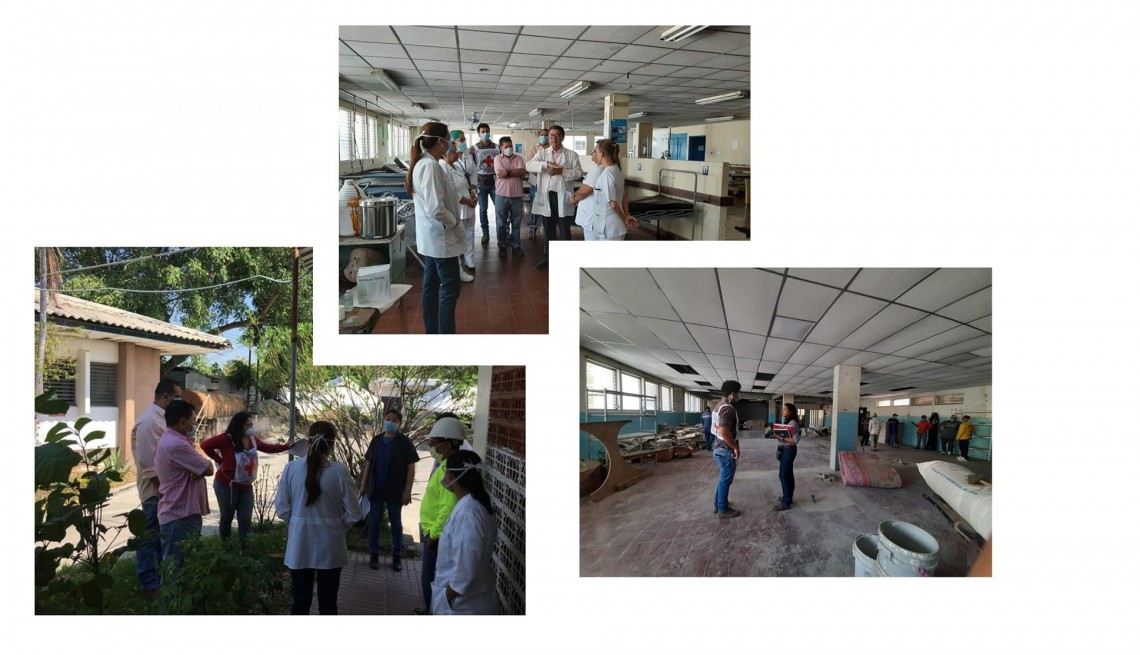
The ICRC forwarded some practical suggestions to the Police and Armed Forces in order to contribute to their efforts to prevent, control and manage the pandemic. serie de sugerencias prácticas.
Our forensic team joined with the authorities in the region to distribute a guide for first responders on managing the bodies of persons who have died from COVID-19. PPE was also donated for persons in contact with bodies during their recovery, transport and final disposal.
Regional delegation in Lima (Peru, Bolivia, Ecuador)
In the Apurímac, Ene and Mantaro Rivers Valley region in Peru, we delivered PPE (masks, gloves, goggles and aprons), disinfectants and cleaning products to 15 small health networks located in the Ayacucho, Huancavelica and Junín regions. These networks distributed the material to 61 health centres providing care for more than 100 communities.
In addition to this, we cooperated with health authorities and personnel in setting up hand-washing facilities at strategic places in rural communities in order to further their adoption of measures to prevent COVID-19. This assistance was backed up with informative material such as posters about chlorination and hand washing adapted to the local context.
A shelter for minors without parental care in Ayacucho received a delivery of masks, gloves, disinfectants and cleaning products (sodium hypochlorite, alcohol gel and soap) from which 50 persons benefited (36 minors and 14 workers).
In Peru, Bolivia and Ecuador, a set of recommendations about biosafety and the use of force by the police and armed forces was shared with the Ministries of the Interior and Defence in the three countries and with the police authorities and joint commands of the armed forces.
In Peru, at the request of the Joint Command of the Armed Forces and the National International Humanitarian Law Commission, input was provided for draft instructions concerning armed forces' action during the current health emergency. Help was also given in drawing up manuals for the armed forces and police on the protection of vulnerable groups, including specific guidance concerning the LGTBI population.
In Ecuador, at the request of the Ministry of Defence, input was provided for the drawing up of draft instructions regarding the use of force by the armed forces.
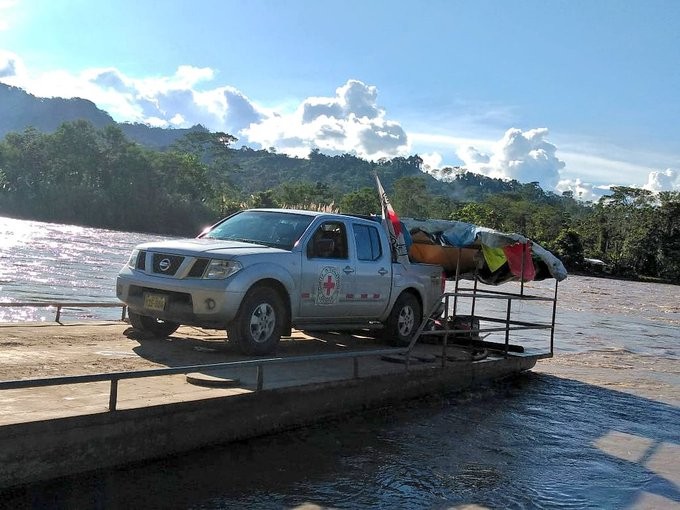
In the prison sector in Peru, we delivered hand soap and detergent for the prison population and health staff, as well as alcohol gel, paper towels, masks, gloves, safety glasses and protective boots for health workers, from which some 15,000 persons benefited.
We also delivered PPE (masks, gloves, disposable caps and bleach) to the Peruvian Red Cross to enable volunteers in the Lima branch to pursue their activities in the Casa para Todos shelter on the Plaza de Acho (Metropolitan Municipality of Lima) and the Abrazo de Paz shelter in the Los Olivos District Municipality, both of which run Restoring Family Links services (messages and registration of vulnerable persons with a view to protection and assistance).
In Ecuador, we delivered PPE to the Ecuadorean Red Cross with which we work to support migrants' shelters and to Restore Family Links.
In Bolivia, we are joining with the Bolivian Red Cross to mount a national information campaign on the prevention of COVID-19. This takes the form of radio spots in indigenous languages and messages on the social media. We also delivered disinfectant and PPE to volunteers in the nine departmental branches in the country.
The ICRC supports the Pasos Firmes association in the Comas district of Lima, Peru, by supplying food aid for more than 130 migrant women and 200 children. The Sin Fronteras shelter received food and cleaning products. Toiletries and cleaning products were delivered to the San José pastoral centre.
In the Pichincha, Guayas, Cotopaxi, Sucumbios, Imbabura and Carchi provinces of Ecuador, we provided emergency assistance to 23 shelters for vulnerable migrants and refugees and to isolation centres for COVID-19 patients. Personal protection consumables and hygiene articles were delivered for more than 3,000 persons. In some cases, we also installed showers and lavatories and, together with the Ecuadorean Red Cross, we set up Restoring Family Links services to enable homeless persons, migrants, including refugees, unaccompanied minors and COVID-19 sufferers in isolation centres and shelters to get in touch with their families using free telephone calls and video links.
At the request of the Peruvian authorities, the ICRC supplied the Forensic Medicine Institute with N95 masks, protective goggles, FFP3 face masks, chlorhexidine gluconate, alcohol and body bags. We also shared general guidance on the management of dead bodies with the Institute.
In Ecuador, we have been cooperating for several years with the National Service of Forensic Medicine and Forensic Sciences by providing technical assistance and training in human identification, the good management of cemeteries, the management of mortal remains in disasters and other related subjects.
At the outset of the COVID-19 emergency, we shared with the Ecuadorean authorities a document entitled "General guidance for the management of the dead related to COVID-19" drawn up by the ICRC Forensic Unit, which contains guidelines on the necessary precautions to be taken in this respect.
We also delivered body bags, biosafety suits and N95 masks to the above-mentioned service for use by the Forensic Service, the armed forces, the police and other public entities when picking up, transporting and disposing of human remains in Guayaquil and the surrounding areas.
In addition, we have offered the Government and State of Ecuador the assistance of an adviser who can give technical guidance to the relevant authorities on the management of bodies from hospitals or elsewhere.
Regional delegation in Brasilia (Argentina, Brazil, Chile, Paraguay, Uruguay)
The regional delegation for Argentina, Brazil, Chile, Paraguay and Uruguay engaged in a range of action, including some new activities, in order to respond to COVID-19.
The ICRC promoted dialogue between the prison authorities of the five countries in the region concerning the challenges posed by the pandemic in detention centres, which are places that are particularly vulnerable to infection. In this setting, protocols are crucial and they have therefore been reviewed. In addition, donations of sewing and cleaning machines and inputs for the production of protective equipment are in the pipeline for the five countries' prison systems.
General recommendations aimed at guaranteeing protection, dignity and respect in the management of bodies of persons who have died from COVID-19 were shared with the authorities of the five countries, as was technical guidance with health and forensic specialists and officials engaged in the response to the pandemic.
In view of COVID-19, practical recommendations, based on international human rights standards in the use of force, were formulated for the Police and Security Forces by way of disaster preparedness and were shared with the authorities in the region. Recommendations were likewise sent to the military commanders of the five countries on health precautions and the use of force during operations to maintain law and order in which the armed forces might participate.
The ICRC, along with the International Federation, is supporting the National Red Cross Societies in the five countries. The Argentine Red Cross is offering remote psychosocial counselling to 50,000 persons and is helping out in the health system. The Brazilian Red Cross is sanitizing public areas and assisting with vaccination drives. The Chilean Red Cross is taking part in vacccination and blood donation campaigns. The Paraguayan Red Cross accompanies deliveries of food to schools in vulnerable areas and provides health services, psychosocial counselling and practical assistance to persons in quarantine. The Uruguayan Red Cross offers distance care and monitoring of persons. It also distributes asceptic and protective kits and informative material.
The Restoring Family Links Programme was adapted so that it could continue in operation despite the pandemic. It offers migrants, including refugees, the possibility of keeping in contact with their loved ones through telephone calls or internet messages in all the countries of the region.
In Brazil, the ICRC provides this service directly in the north of the country in the towns of Boa Vista and Pacaraima (Roraima State) and Manaus (Amazonas State). In March, migrants availed themselves of more than 24,000 telephone calls, messages and other services.
Support for the family members of missing persons was stepped up, as they already suffer from not knowing the whereabouts of their loved ones.
Action to improve respect for and the physical and mental health care of health care professionals, welfare workers and teachers, is being carried out especially in the six towns in Brazil which have associations implementing the ICRC Safer Access Framework, namely Duque de Caxias, Florianópolis, Fortaleza, Porto Alegre, Rio de Janeiro and Vila Velha. Donations are being made in order to upgrade COVID-19 prevention among workers providing essential public services.
In Brazil, the ICRC donated protective material, personal hygiene kits and cleaning products in Boa Vista and Manaus to promote the prevention of COVID-19 in the north of the country. The items were sent to Government-run bodies caring for migrants and vulnerable population groups. The armed forces handled the logistics.
The host population and migrants in Pacaraima, on the Brazilian side of the border with Venezuela, received hydraulic equipment for the water supply, this being essential for hygiene, one of the main ways of preventing COVID-19 infection. The equipment upgraded sanitary facilities and access to water in schools, community centres and health posts.
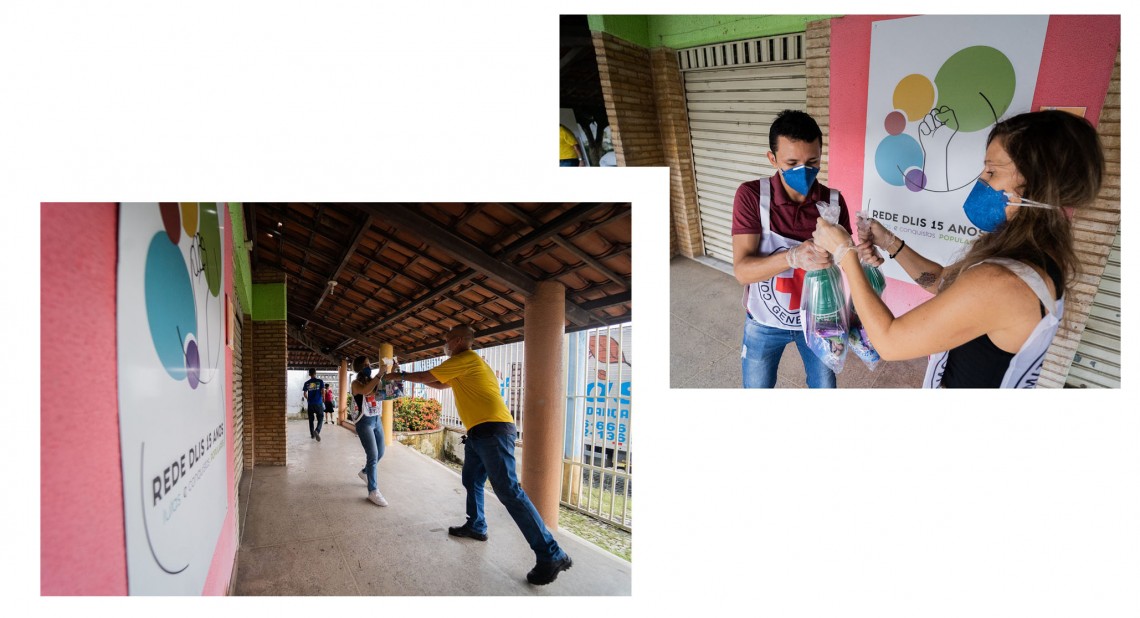
The ICRC is also present in Fortaleza, in the north-east of Brazil, where it helps authorities to respond to the humanitarian consequences of armed violence by supplying families of displaced persons and underserved communities affected by the violence with hygiene products and income transfers.
Panama
From our regional delegation in Panama, we supply material support to enable the National Red Cross Societies in Panama, Cuba, the Dominican Republic, Jamaica and Haiti to respond to the COVID-19 emergency by obtaining PPE. It also provides logistic support and delivers PPE to the Darien branch of the Red Cross Society of Panama in order to enable it to continue its Restoring Family Links activities which is of most benefit to migrants.
In Panama and the Dominican Republic, we advise the prison authorities about the management and mitigation of infection in prisons among persons deprived of their liberty and we assess the support that will be required to promote drives to disinfect premises.
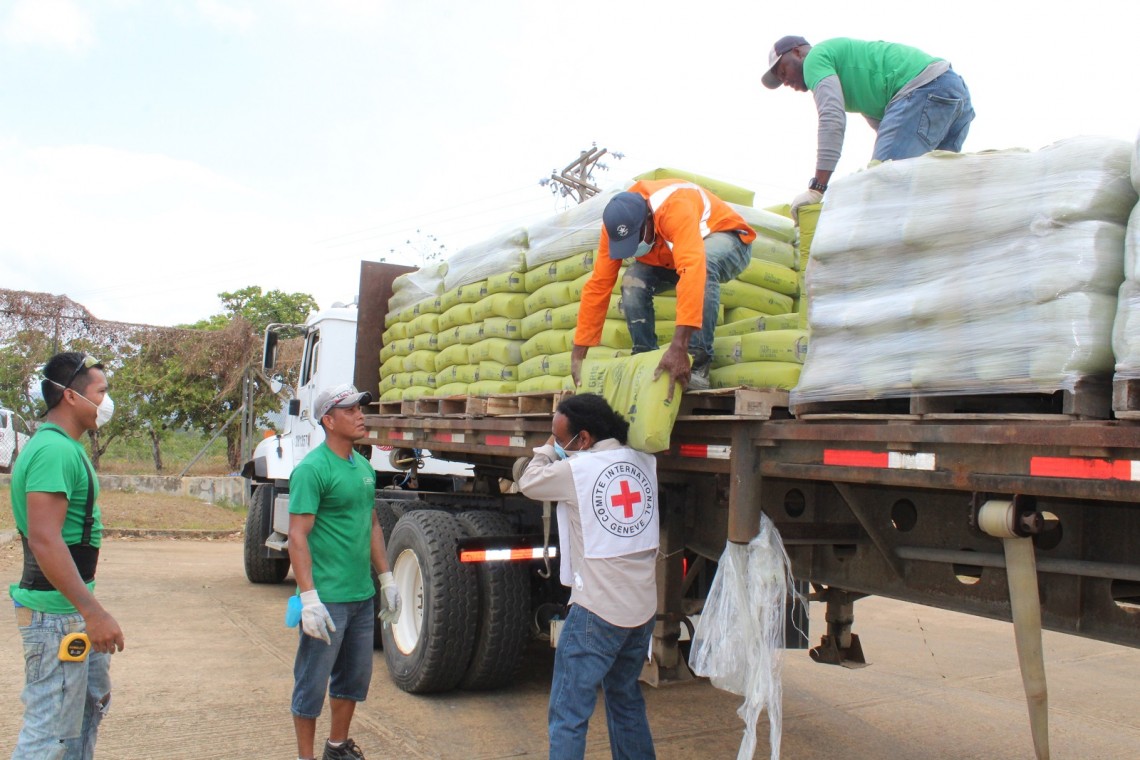
In Panama, we offer material support for the renovation and running of the clinic which serves Las Joyas, the country's main prison complex. The clinic is being extended with a triage area and observation ward. Three water containers, previously donated to the authorities by the ICRC, are being fitted out as hand-washing facilities in the main entrances of the three prisons.
We also deliver personal hygiene items (soap, detergent and sanitary pads) along with information sheets about measures to prevent the coronavirus for all the prisons in the country.

